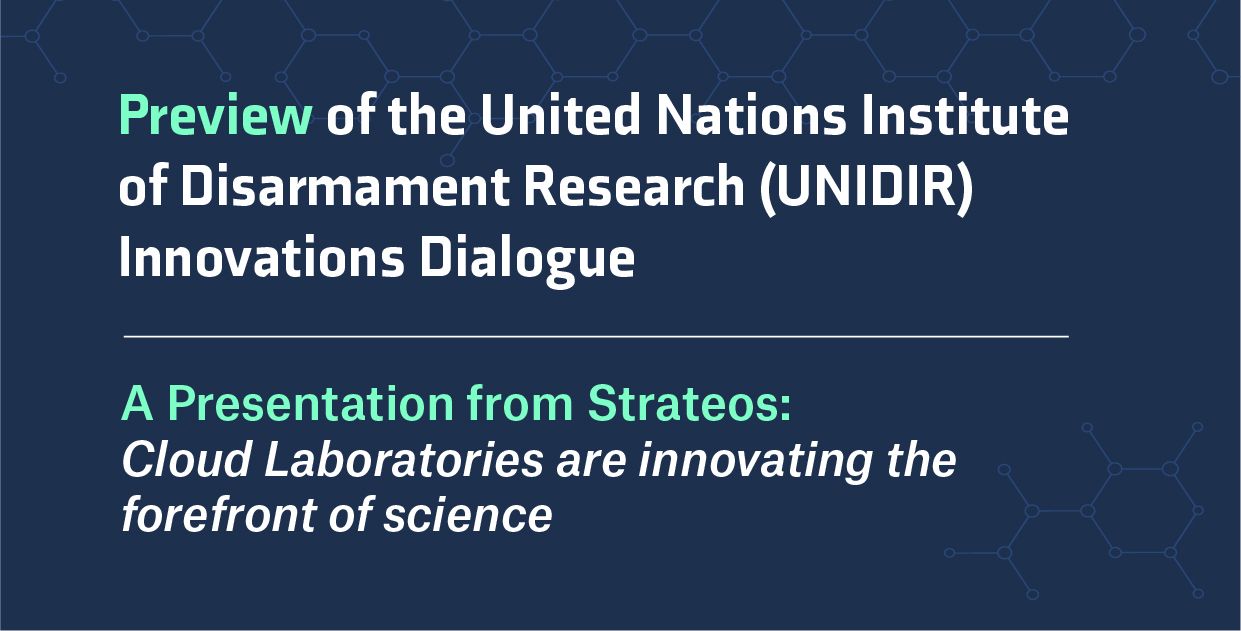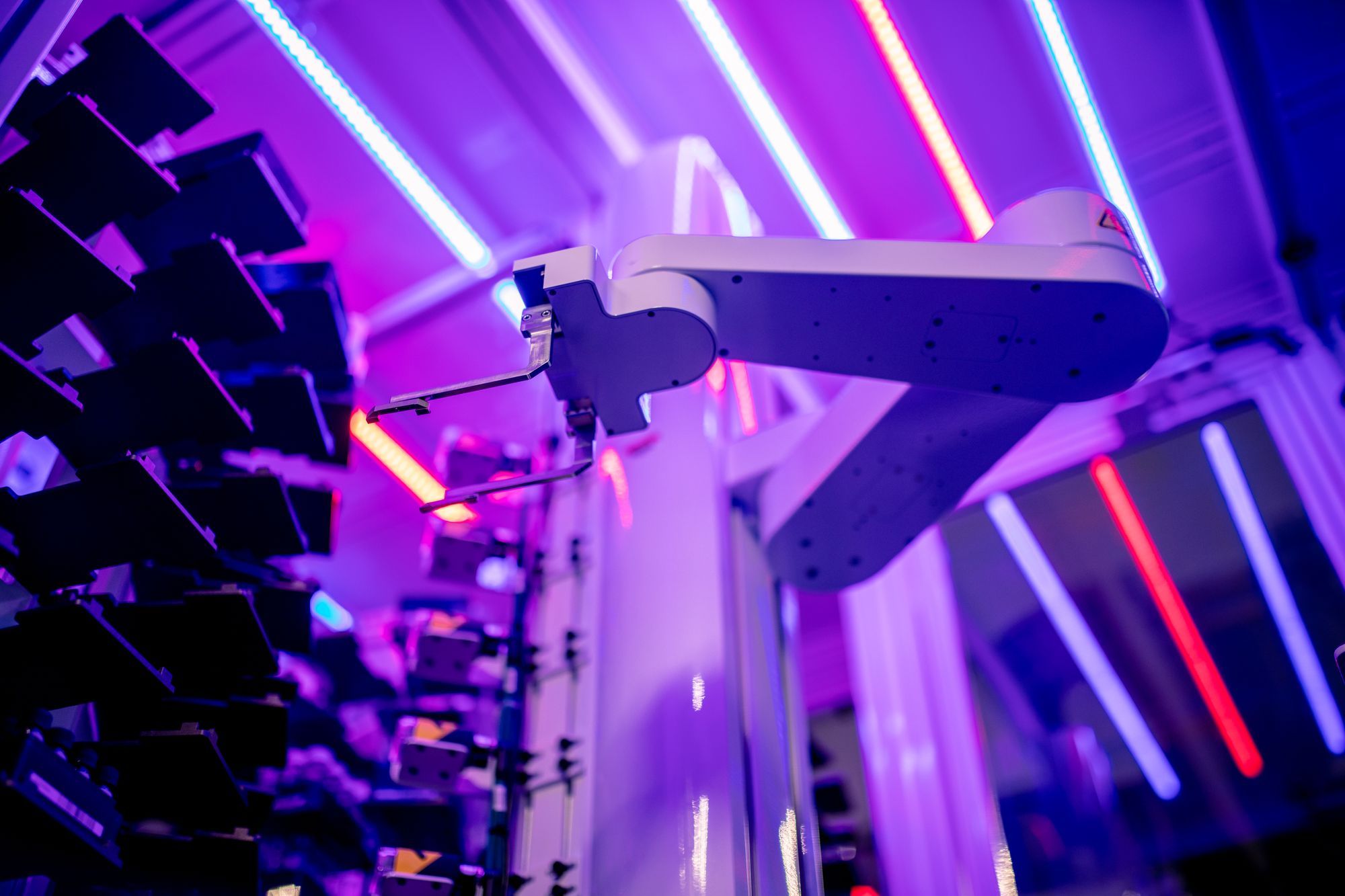The United Nations Institute for Disarmament Research (UNIDIR) Innovations Dialogue
We look forward to participating once again in this discussion with UNIDIR, to help to explore the positive societal impacts and potential biosecurity concerns.

A Presentation from Strateos: Cloud Laboratories are innovating at the forefront of science
The pace of science is accelerating and it’s hard to fathom how far and fast we have come. The Human Genome Project, the blueprint of humankind, was an immense scientific undertaking costing billions of dollars and taking over a decade to complete. Building on the data and technology that's now been developed, the same scientific endpoints can be generated in less than a day. Riding the waves of new technology into the future will only accelerate this process.
The Rise of the Cloud Laboratory is Increasing the Pace of Scientific Discovery
The rise of cloud labs is leading to faster and greater scientific innovations, allowing scientists to leverage their time and focus on experimental design and data analysis instead of labor intensive work at the bench. Further coupled with artificial intelligence and machine learning, these innovations drive iterative loops of investigation, decreasing the time from hypothesis to experimental design to data acquisition.
The Cloud Lab is Ushering in a Sea Change
As biology is miniaturized, quantized, and accelerated, we envision cloud labs ushering in a sea change for what experiments we are capable of executing. Similar to the paradigm shift from human computers to silicon ones, the shift in biological execution from the bench to automated work cells opens up new avenues of scientific thought and advancement. These technologies and benefits are boundless and are just beginning to be realized. Strateos strives to be at the forefront of this exciting new era of automation and scientific innovation.

Cloud lab benefits:
- Automation focused, ensuring repeatability and reproducibility
- A programmatic and cloud-enabled interface to science
- Enabling scientists to coordinate novel, massively parallelized resources thus increasing scalability and the democratization of science.
Biosecurity is Vital in the Cloud Laboratory
Strateos has been a pioneer in cloud labs, with a focus in automating synthetic biology, biomarker discovery, and chemical synthesis. As innovators in this field, we recognized the vital role of biosecurity and have contributed to multiple publications, as well as our work with the Department of Defense’s National Defence University; evaluating biosecurity issues such as the potential for misuse, and the vulnerabilities of these tools and capabilities.
A Closer Look at Strateos’ Presentation
We look forward to participating once again in this discussion with UNIDIR, to help to explore the positive societal impacts and potential biosecurity concerns. During the panel, we’ll discuss cloud labs in general, briefly introduce Strateos, give a demo of how to use Strateos Robotic Cloud Laboratory, and discuss broader security issues.
Innovations Dialogue:
UNIDIRs Innovations Dialogue explores how emerging technologies impact international security. Timely for this year is the focus on life science. The panel discussions will focus on creation (gene editing), investigation/production (cloud labs, diy labs), and deployment (nanobiotech).
Strateos Blog Note
Peter Lee’s panel discussion on “Product: Cloud Labs & DIY Labs” hosted by UN Institute for Disarmament Research will be on August 20 at 15:45 CET during “The 2020 Innovations Dialogue: Life Sciences, International Security And Disarmament.” We’ll be joined by Todd Kuiken from NC State discussing DIY labs and moderated by Jaimie Yassif, Senior Fellow at Nuclear Threat Initiative. Recordings will be available afterward. Please RSVP here.
Bio note
Peter Lee is Director of Science and Technology at Strateos and oversees strategy, development, and coordination of external partnerships with academics, biotechs, and pharmaceutical companies to lower the barrier to scientific automation and enable cloud-connected science. Along with the team at Strateos, Peter believes that automation augments and improves science and opens the door to investigation at scales and speeds not previously possible. Peter is a principal investigator on a US government award applying programmatic data generation to synthetic biology and serves as a judge for the Society for Laboratory Automation and Screening Innovation Award. Motivated to increase scientific accessibility, Peter serves as a curator for the open-source scientific protocol language, Autoprotocol. Peter has published in multiple journals over the past 20 years and holds a B.A. in Biochemistry from Rice and a Ph.D. in Chemical and Systems Biology from Stanford.
